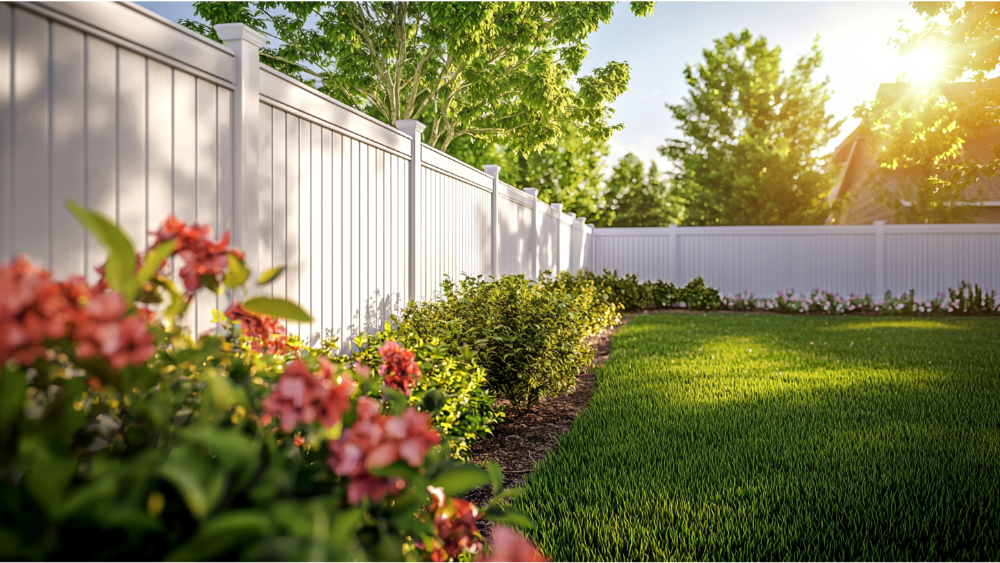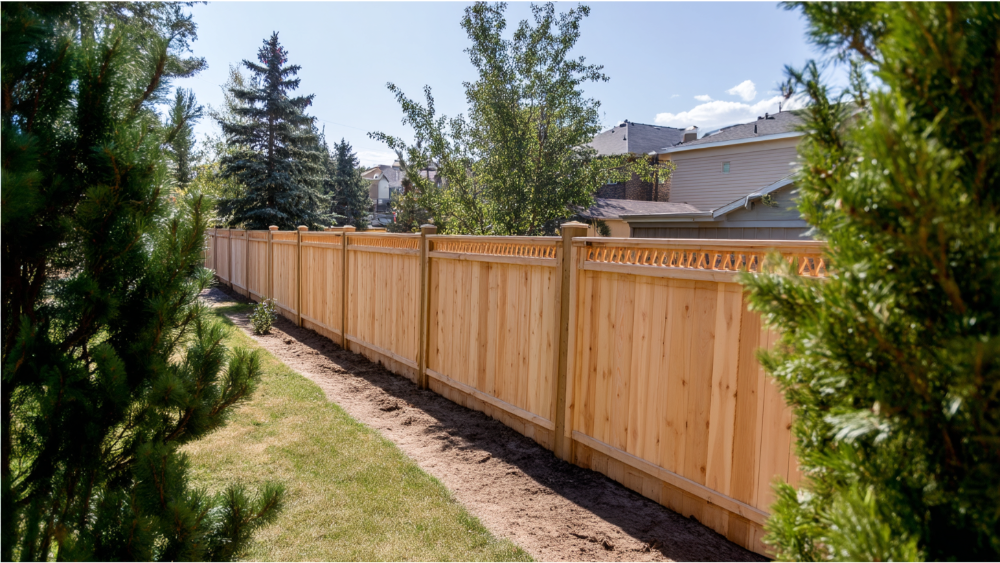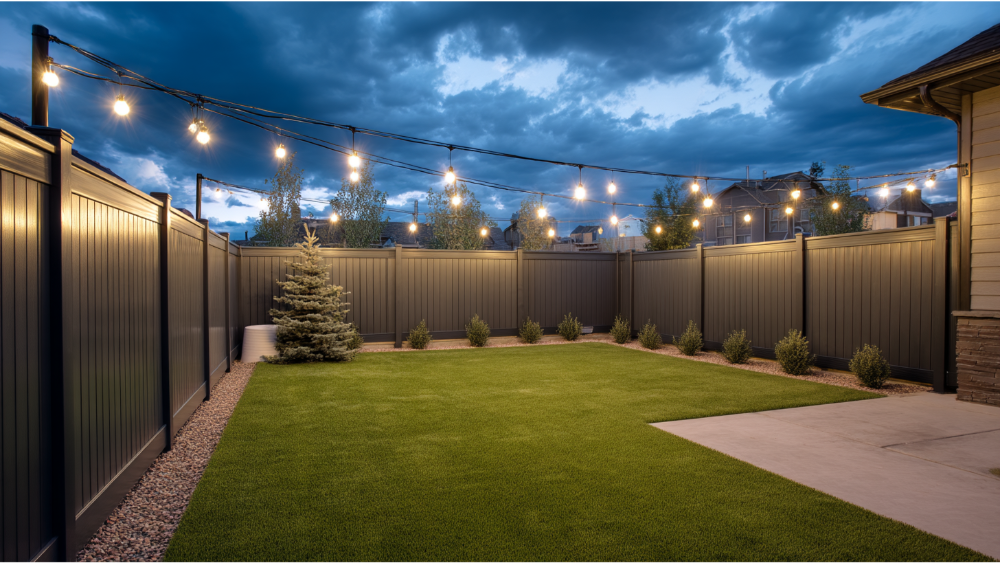Keeping your vinyl fence clean is essential for maintaining its appearance and durability. Unlike other materials, vinyl is low-maintenance, but it still requires occasional cleaning to remove dirt, grime, and stains. With the right tools and techniques, you can easily restore your fence to its original shine.
7 Step-by-Step Guide to Clean a Vinyl Fence

1 | Rinse with Water
Start by rinsing your vinyl fence with a garden hose to remove loose dirt and debris. This step will help you identify areas with more stubborn stains or build-up. Make sure to cover the entire surface, including corners where dirt tends to accumulate.
2 | Prepare a Cleaning Solution
Mix a mild cleaning solution by combining water and a small amount of dish soap or a specialized vinyl fence cleaner. Avoid using toxic or abrasive chemicals, as they can damage the finish or cause discoloration. Use a bucket to prepare the solution and a soft cloth or sponge to apply it.
3 | Scrub the Fence
Use a soft-bristled brush or sponge to scrub the fence gently, focusing on areas with stubborn stains. Apply extra cleaning solution as needed to tackle spots like grease, dirt, or tint vinyl fencing green. Be careful not to scratch the surface, as vinyl can show wear when too much force is applied.
4 | Use a Pressure Washer (Optional)
For deeper cleaning, consider using a pressure washer to remove grime that manual scrubbing cannot tackle. Keep the pressure setting low to prevent damage to the vinyl surface. Always maintain a safe distance between the nozzle and the fence while spraying.
5 | Rinse and Inspect
Thoroughly rinse the fence with clean water to remove any soap residue. Inspect the fence for any remaining stains and reapply the cleaning solution as necessary. Ensure every section of the fence is free of dirt or cleaning products to prevent dulling over time.
6 | Address Stubborn Stains
For particularly tough stains or tint vinyl greening, use a specialized vinyl stain remover. Follow the manufacturer’s instructions carefully to avoid causing damage to the fence. Always test the product in a small, inconspicuous area first before applying it to a larger surface.
7 | Dry and Final Check
Allow the fence to air dry fully or wipe it with a clean, dry cloth to prevent water spots. Once dry, inspect the fence again to ensure it looks clean and shiny. Regular maintenance every few months will help preserve your fence and keep it looking like new.
6 Key Supplies Needed

1 | Pressure Washer
A pressure washer is essential for effectively cleaning vinyl fencing, as it provides the power needed to remove mildew, dirt, and grime. Ensure to hold the pressure washer wand firmly and adjust the pressure to avoid damaging the fence surface. This tool simplifies maintenance and is ideal for thorough cleaning tasks.
2 | Mild Soap or Cleaning Solution
A gentle soap or specially formulated cleaning solution can help break down dirt on your vinyl fence without causing discoloration. These solutions are particularly helpful for areas where pressure washing alone might not be sufficient. Always mix and use the cleaning solution according to the manufacturer’s guidelines.
3 | Commercial Rust Remover
For fences exposed to hard water or metal fixtures, a commercial rust remover is ideal for eliminating rust stains. These products are specially designed to tackle tougher stains without harming the vinyl surface. Spot test the rust remover on a small section before applying it to the entire affected area.
4 | Soft Bristle Brush
A soft bristle brush is crucial for scrubbing away stubborn grime or stains during cleaning. This tool aids in reaching grooves or textured patterns that pressure washing might miss. Use the brush in conjunction with a cleaning solution to avoid scratching the vinyl.
5 | Garden Hose
For rinsing off cleaning solutions and debris after scrubbing, a sturdy garden hose works hand-in-hand with other tools. It provides a steady flow of water, ensuring no residue is left behind. Pair this step with pressure washing for an optimal result.
6 | Bucket
A durable bucket is an essential supply when cleaning a vinyl fence. It serves as a container for mixing cleaning solutions or carrying water to areas without easy access to a hose. Opt for a bucket with a sturdy handle for convenience, and ensure it is large enough to accommodate your cleaning tools and solution.
7 Preventive Maintenance Tips

1 | Regular Cleaning Schedule
Establish a routine to clean your white vinyl fence at least twice a year. This helps to remove any dirt or grime before it becomes deeply embedded. Use a mild cleaning solution alongside a flush pressure washer for debris removal. Avoid letting dirt accumulate to the point where you need to use harsh chemicals as they can degrade the material over time.
2 | Inspect for Damage
Periodically inspect both traditional wooden fencing and vinyl fencing for cracks, discoloration, or structural issues. Address small concerns promptly to prevent them from worsening. Keep an eye on areas prone to algae or mildew forming, especially after rainfall. Regular maintenance can save time and effort when compared to larger repairs later.
3 | Avoid Harsh Cleaning Practices
When cleaning your white vinyl fence, avoid using abrasive cleaning tools or solutions. Instead, opt for a soft cloth or brush to carefully scrub stubborn stains without damaging the surface. Test any new cleaning products on a small, inconspicuous area first. This will ensure you don’t unintentionally harm the material.
4 | Monitor Nearby Plants and Landscaping
Trim back plants or shrubs that grow too close to your fence to prevent unnecessary wear and tear. Overgrown branches can scratch and damage both vinyl and traditional wooden fencing. Additionally, prevent soil and mulch from building up at the base as it can lead to staining over time. Keeping the surrounding area tidy will help prolong the lifespan of your fencing.
5 | Prevent Mold and Mildew Growth
To avoid mold and mildew, ensure your fence gets sufficient sunlight and airflow. Use a mild detergent and water with a flush pressure washer to clean areas prone to dampness. Inspect shady sections for early signs of discoloration and clean them immediately. Staying ahead of mold buildup prevents the need for harsh chemicals later.
6 | Repair Damage Promptly
Regularly inspect your fence for any signs of damage, such as cracks, chips, or loose panels. Addressing these issues early can prevent them from worsening and compromising the structural integrity of the fence. Use appropriate materials and tools to make repairs, or consult a professional for more significant issues.
7 | Apply Protective Coatings
To enhance the durability of your fence, consider applying a weather-resistant sealant or stain. These coatings help protect the material from moisture, UV rays, and other environmental factors that can cause wear and tear over time. Reapply as necessary to keep your fence looking fresh and well-maintained.
Frequently Asked How To Clean Vinyl Fence Questions
What is the Best Thing to Clean a Vinyl Fence With?
The best way to clean a vinyl fence is by using a mixture of mild soap and water, paired with a soft bristle brush or sponge. If you have access to a garden hose with an on-board soap reservoir, this can make the process even more efficient by evenly dispensing the cleaning solution. Avoid harsh chemicals or abrasive materials, as they can damage the surface of the vinyl. Regular cleaning with these tools will keep your fence looking pristine and free of dirt, mold, or stains.
Should you pressure wash a vinyl fence?
While it is possible to pressure wash a vinyl fence, it should be done with caution. Using too high of a pressure setting can damage the surface of the vinyl or cause discoloration. If you choose to pressure wash, use a low-pressure setting and maintain a safe distance from the fence. Always test a small, inconspicuous area first to ensure no harm is done to the material.
Will vinegar damage a vinyl fence?
Vinegar is a safe and effective cleaning agent for vinyl fences when used properly. It is a natural, non-abrasive solution that can help remove dirt, grime, and mildew without causing harm to the material. However, it is important to dilute the vinegar with water to avoid any potential discoloration over time. Regular cleaning with a vinegar solution can help maintain the pristine appearance of your vinyl fence.
Will bleach damage a vinyl fence?
Bleach can be used to clean a vinyl fence, but it should be handled with caution. While it is effective at removing tough stains, mold, and mildew, undiluted bleach can potentially cause discoloration or weaken the material over time. To avoid damage, always dilute bleach with water and test it on a small, inconspicuous area first. Proper use of bleach in moderation can help keep your vinyl fence clean without compromising its durability.
Conclusion
Maintaining a vinyl fence is straightforward and requires minimal effort when proper care techniques are followed. Using safe, non-abrasive cleaning agents like diluted vinegar ensures the fence remains clean without risking damage. Regular cleaning and maintenance can significantly extend the lifespan of the fence while preserving its aesthetic appeal. Addressing stains or buildup promptly prevents long-term discoloration or deterioration. With consistent care, a vinyl fence can stay beautiful, durable, and functional for years to come.




